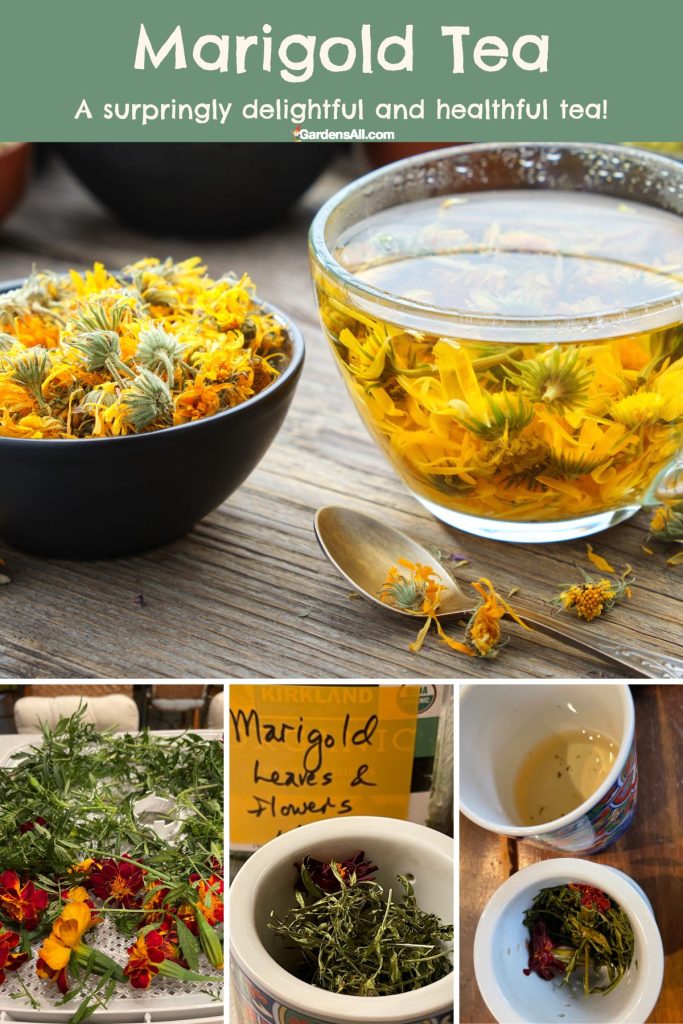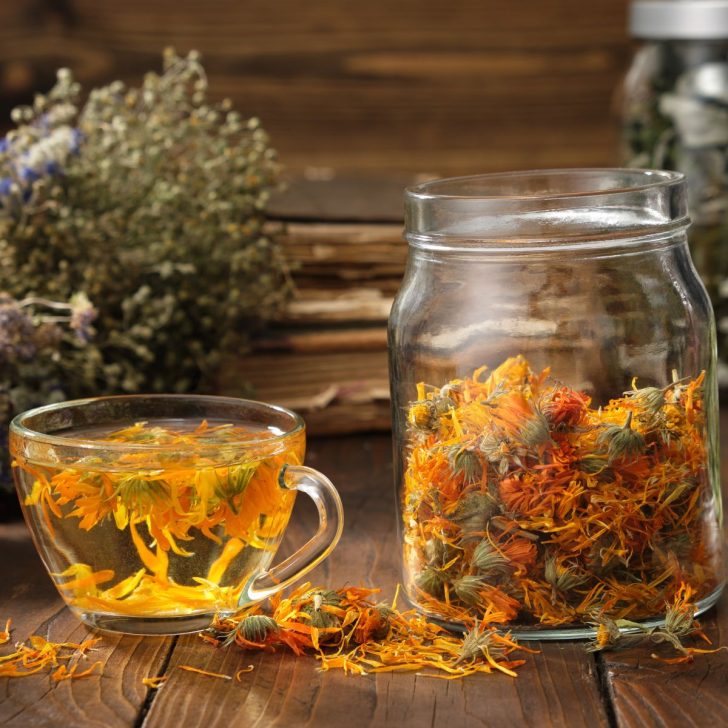Derived from the Tagetes species, this aromatic and pungent tea is a treasure trove of health benefits and cultural significance. While not as commonly known or used for its medicinal properties as the ubiquitous Calendula “Pot Marigold” the Tagetes varieties of true marigolds do indeed bear gifts for health.
The Tagetes genus, which includes varieties like Tagetes erecta, Tagetes patula, and Tagetes tenuifolia, offers a range of flavors and therapeutic properties. This article expands on the benefits and uses of marigold leaves and flowers for herbal tea, and incorporating insights from recent studies that underscore its potential as a functional ingredient in health and wellness.
Marigold Tea Recipes

Brewing Instructions:
We favor the following method for preserving maximum nutrients.
- Boil: Bring water to boil; remove from heat.
- Add herb: 2 tablespoons of fresh or 1 tablespoon dried leaves or flowers to infuser teapot or infuser teacup.
- Pour hot water over herbs
- Steep for 5-10 minutes.
- Strain the infusion.
- Sweeten, if desired.
- Serve hot/warm or add ice for a cold brew.
These instructions are suitable for all the recipes provided below.
LEAVES: Marigold Leaf Teas
- Marigold and Thyme Tea: A blend of marigold leaves and thyme, perfect for a soothing throat remedy.
- Marigold Leaf and Ginger Tea: A spicy concoction of marigold leaves with a hint of ginger, ideal for digestion.
- Marigold Leaf and Cinnamon Tea: Marigold leaves with cinnamon for a warming and comforting brew.
FLOWERS: Marigold Flower Teas
- Apple Tea With Tagetes Flower: A sweet and floral combination of marigold flowers with apple slices.
- Hibiscus and Marigold Flower Tea: A tangy mix of marigold flowers and hibiscus roselle tea, known for its vibrant color and tartness.
- Marigold Flower and Elderflower Tea: A delicate and aromatic pairing of marigold flowers with elderflower.
Marigold Leaf and Flower Blend:
- Tagetes Totalis Tea: A full-bodied blend using both marigold leaves and flowers, balanced with a hint of mint leaves for added freshness.

The Benefits of Marigold (Tagetes spp.)
Marigold Leaf Tea Benefits
The leaves of the Tagetes plants are a source of important phytochemicals with known biological activities. They are reputed for their antioxidant properties, which play a role in mitigating oxidative stress and may enhance immune function.
Marigold Flower Tea Benefits
Tagetes spp. flowers are not only a feast for the eyes but also for the body. They boast a rich composition of bioactive compounds that have been associated with anti-inflammatory and antimicrobial properties, contributing to the overall health-promoting qualities of the tea.
Ethnobotanical Benefits and Uses
Tagetes spp. have been revered for their ethnobotanical significance, serving as a staple in traditional medicine, culinary practices, and spiritual rituals across various cultures. The plants have been utilized for their therapeutic properties, which include alleviating symptoms of cold and flu, gastrointestinal discomfort, and as a natural dye in foods.
My favorite way to enjoy microdoses of the Tagetes Marigold benefits is through the surprisingly delightful herbal Marigold tisane.
The Science on Marigold (Tagetes spp.) Healthy Properties
Scientific analysis of Marigold confirms the presence of various compounds with antioxidant, anti-inflammatory, antifungal, and antibacterial properties, which substantiate the traditional use of marigold in treating a plethora of ailments.[1]https://www.mdpi.com/1420-3049/23/11/2847
The Tagetes essential oils have been particularly noted for their antimicrobial activity, which suggests a potential role in managing infections.
You can find lots more in our articles on the many Marigold benefits and details on Marigold as insecticide as well as the Marigold history here.
In light of these findings, Marigold emerges as a testament to the convergence of age-old wisdom and modern science, offering a natural, healthful option for those seeking wellness through herbal teas.
The Tagetes species, with its diverse varieties, stands out as a plant with a rich legacy and promising future in the realm of natural health products. Whether enjoyed for its pleasantly pungent taste and aroma or its therapeutic virtues, this herbal tea is a delightful addition to any tea lover’s herbal collection.

I’m LeAura Alderson, a garden, herb and plant enthusiast with a passion for discovering the many edible and medicinal benefits of the plants all around us, including the weeds! I’m a writer, editor and media publisher for our family of websites.
While I was certified in fitness and life coaching, I am NOT a health practitioner. However, I’m a lifelong health enthusiast, with a keen interest in healthy, organic foods and making home remedies and the content we share is from our own experience and usage as well as that extracted from scientific research so that you can explore further on your own.
Always seek the advice and guidance of your health practitioners first and foremost.
As a family we’re steadily expanding our gardening, experimentation and knowledge around all things gardening, edible landscaping, fresh organic foods and self sustainability with farming in our future. I also own and manage iCreateDaily.com, a site all about transformation through creation, and the power of positivity, optimism and mindset.
References
| ↑1 | https://www.mdpi.com/1420-3049/23/11/2847 |
|---|

